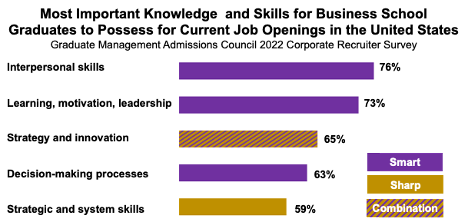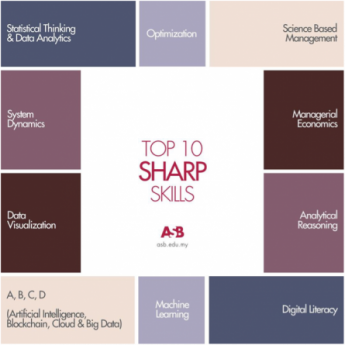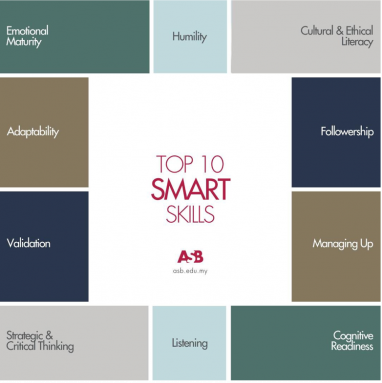How To Choose A Master In Management Program: Find A Program To Put You On Career Fast-Track
Master in Management (MiM) degrees are a great choice for recent college graduates who want to ready themselves for better jobs at higher salaries. The degree grounds students in crucial business management skills. Boston University’s Master in Management program provides students with the skills employers are seeking by executing projects for real clients, solving real business challenges, and preparing for a rewarding career. Unlike any other business master’s program, students undertake a client-based project every seven weeks — 4 in all.
MiM programs approach preparing students to start their careers very differently. Differences in program design are largely the result of how each course of study integrates what Prof. Loredana Padurean of Northeastern University calls Sharp skills (hard skills such as data analysis) and Smart skills (soft skills such as emotional maturity) into student learning experiences. In her book “The job is easy, the People are Not” Prof. Padurean describes educators’ tendency to over-emphasize Sharp skills at the expense of Smart skills. This tendency persists even though Smart skills are highly valued and sought after in the workplace.
Smart skills ladder up to higher level capabilities such as teamwork, effective communication, leadership, and problem-solving. Smart skills consistently outrank Sharp skills in the leading employer surveys of hiring practices and criteria. For example, in the Graduate Management Council 2022 corporate recruiter study, three of the top five most important skills were Smart and one of the five was a combination of Smart and Sharp skills.

Sharp skills encompass the technical and functional work of business. They range from technical capabilities such as data analytics, risk management, and systems to functional knowledge such as marketing, sales, operations, finance, accounting, and organization development.
Many MiM programs take an “open library” approach to building Sharp skills. They make a wide array of courses from their graduate and undergraduate programs available to MiM students. In the name of flexibility and customization, students build their own course of study. Open library programs often fail to meet the needs of recent graduates. Foundational topics can be overlooked or have limited availability. MiM students may find themselves in classes with MBA students tackling content that is too advanced for their experience. The mix of proficiency in some areas and familiarity in others is rarely thought through.

Tailored MiM programs focus on a narrower set of Sharp skills that are foundational to business success. They limit course participation to MiM students so course discussions and assignments can be calibrated to MiM students’ level of experience and entry-level job aspirations. Electives, if offered, are limited in number and tied to specific career paths. Tailored MIM programs ensure that basic proficiency is built in key areas such as financial literacy and customer-centricity. All of the top three ranked MiM programs in the U.S. (QS World University Rankings) are custom tailored.

Smart skills encompass how work gets done in business. They are needed to navigate through life, work, and careers successfully. Emotional maturity, adaptability, strategic thinking, and listening are examples of Smart skills. Smart skills enable individuals to work effectively in teams, lead organizations, and respond to situations and challenges with intelligence, empathy, and diplomacy.
Students develop Smart skills through exposure to solid theory, reinforced through assignments and cases, that is applied through experiential team interaction. Experiential learning through hands-on projects with real companies is the key, and often missing element, in building Smart skills in many MiM programs. In many programs, experiential projects are not available. In other programs, a capstone project is offered, but it’s not closely integrated with the theory, and assignments taught in other courses.
The following ten questions are a great way to evaluate the strength of experiential learning in any MiM program. They are a checklist to ensure an MiM program will build the Smart skills that are crucial to success.
- Does each student work on multiple projects during the year, just one or none?
- Are the companies large and complex enough to offer stimulating challenges?
- Are the projects undertaken in small teams of five or six students?
- Is each team supported by weekly discussions with a faculty mentor?
- Are contributions to teams evaluated? Do students participate?
- Do students learn to deploy project management processes, such as Scrum Agile, that allow for effective client input and team improvement?
- Are deliverables and objectives clearly defined and tied to explicit learning goals?
- Are experiential learning projects a large portion of credits toward graduation?
- Are there a large number of repeat partners? That’s a sign they value the projects.
- Are the projects celebrated in forums that include faculty and student participation?
MiM programs with strong experiential learning components represent an elite group. They require significant investment and a faculty that has substantial experience in leading corporate teams. The benefits of experiential learning go far beyond building Smart skills. Experiential learning is more engaging for students, it enhances the application of Sharp skills, and helps students be more effective in career exploration.
BU’s Master in Management program takes project-based learning to the next level. Unlike any other business master’s program, students undertake a client-based project every seven weeks — 4 in all.
About BU’s One-Year Master in Management degree program
Boston University’s top-ranked Master in Management degree is exactly what you need to get ahead. Fast-track to the high-paying jobs and professional business career you’re dreaming of with a one-year business master’s degree at a world-renowned university.
In our one-year business program, you’ll learn by doing and apply what you’ve learned by working with industry leaders on their business challenges. The inventive design and hands-on learning focus of the Master in Management degree is breaking new ground—providing students with the skills employers are seeking. By breaking the mold, this 12-month business degree replicates a real work experience that makes real impact.

